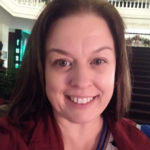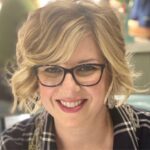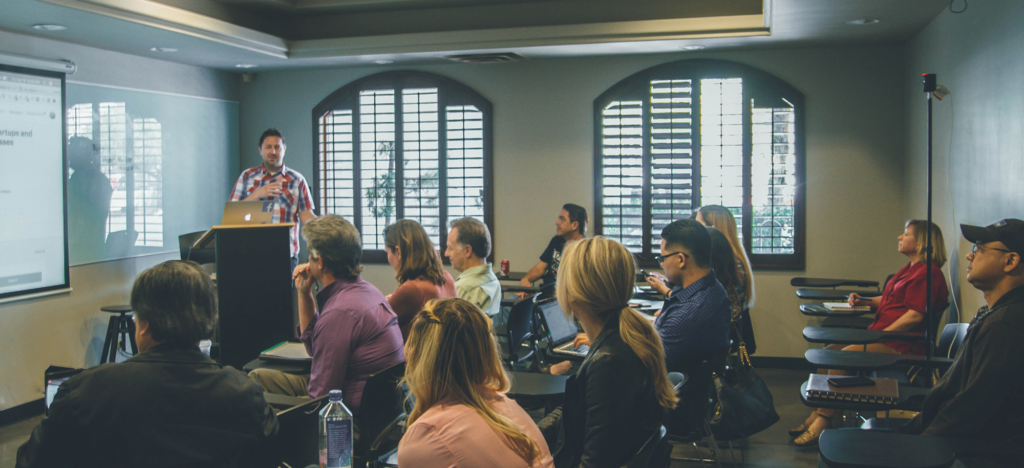As a young mother in 2002, Nancy Squellati began chipping away at a college degree, taking a class or two each year. Squellati had to put her quest on hold in 2014 after a back injury permanently debilitated her husband and her daughter’s chronic health problems worsened.

It was another six years before Squellati enrolled in an online bachelor of health science program at the University of Missouri.
“I had to jump over a lot of self-doubt when I decided to return to school,” said Squellati, who works full time as an oncology patient navigator and is a caregiver to her husband and daughter. “I was being pulled in a lot of directions.”
Squellati expects to complete her bachelor’s degree in health science this fall. “In my 20s, I had no idea what I wanted to do, and felt envious of people who knew,” said Squellati, who is in her late 40s. “Now I have a thirst for learning. There are so many `aha!’ moments I didn’t have the first time around.”
While the number of college-age Americans dwindles — demographers forecast an `enrollment cliff’ starting in 2025 — nontraditional students like Squellati are taking advantage of efforts by universities and states to make completing a bachelor’s or advanced degree more conducive for working adults.
College enrollment continued to drop in spring 2022, down 4.1% from spring 2021. It has dropped 9.6% since a peak of 21 million in 2010, according to an April 2022 Education Data Initiative report. Meanwhile, 39 million adults have some college credits but no degree.
In spite of its cost, higher education continues to boost earning potential for young adults (though financial benefits vary greatly by major), and can provide credentials for career advancement. A recent report highlighting survey results of 1,400 adults who returned to college found that nearly three-quarters earned the credential they sought.

Linda Wilson earned a bachelor’s degree in English education in 1993 and envisioned a teaching career inspiring students à la the character John Keating in “Dead Poets Society.” But full-time teaching jobs were hard to come by then and subbing didn’t bring joy. After a year teaching English in Japan, Wilson landed a job with John Deere, a Fortune 500 company. She climbed the ladder, eventually training company leadership as a human resources manager.
Twenty-plus years into her career and her two children grown, Wilson applied to Kansas State University Global Campus for an online master’s degree in industrial and organizational psychology. Then John Deere offered severance packages as part of a restructuring.
The 2020 buyout allowed Wilson to pursue her degree while also caring for her ailing father. “I took a leap of faith,” she said.
Her classmates were about evenly split between professionals and recent graduates, she said. During one of the program’s two-week intensive summer sessions, Wilson was paired with one of the recent grads for a project.
While her partner was more familiar with the statistical analysis tool they needed to use, Wilson’s professional experience gave her a stronger grasp of the issues. “We made a good team,” she said.
Wilson expects to complete her degree in December and ultimately wants to teach full-time at a university. “I’ve always loved learning, and it’s been a confidence-booster to know I not only can learn something new, but master it,” the 51-year-old said.
At Mississippi State University, efforts to attract adults in the ‘some college, no degree’ category include coaching students to keep them on track.
“Fear is one of the biggest barriers for adult learners,” said Susan Seal, director of the Center for Distance Education at Mississippi State. Students are assigned an advisor, who serves as their guide and point person.
“Some who return want to dive right in,” said advisor Kali Dunlap. “I try to talk them out of overloading themselves with courses, so they can find their rhythm balancing the student role alongside their work/life balance.”
In the past five years, 400 people have earned bachelor’s degrees through the university’s Complete 2 Compete program, Dunlap said. It’s designed for adults who had accumulated 90 college credits. A bachelor of applied science created in spring 2020 allows students with an associate’s degree to have all their technical class credits transferred to Mississippi State.
Seal teaches an MBA class online during the academic year and in person over summers. Students in the online class tend to be professionals, while most enrolled in the summer session are recent graduates.
“My online students have more experiences and more scaffolding to relate to concepts they’re learning, and tend to be more engaged because it’s real to them,” she said. They also are more eager to network, she noted.
Mississippi State’s online programs, largely attended by nontraditional students, account for 13.5% of the university’s student population, up from 8% in 2016, according to Seal.

Javier Cuadras excelled at online college courses he took during his four years as a U.S. Marine. He’d lacked both the direction and money to attend college straight out of high school in San Diego, California.
Encouraged to apply to elite universities, Cuadras enrolled at the University of Pennsylvania College of Liberal and Professional Studies in the fall of 2018, using the GI bill to major in political science.
“I wanted to learn so bad, and I wasn’t nervous about speaking out in class and asking a lot of questions,” he said. “I think all the professors knew me by the second week.”
Cuadras, whose mother emigrated from Mexico, is the first in his family to earn a college degree. He said his military service gave him the space to become a more disciplined student, eager to network with professors and administrators, he said.
Older than his classmates, Cuadras built connections on campus by joining the debate club, serving as vice president of the veterans’ student club and attending cultural events. He was inducted into a Latino honor society.
Cuadras, a legal analyst with Goldman Sachs, said nontraditional students can have an advantage over those who arrive straight out of high school. “You’re competing against intelligent kids, but you’re going to have a leg up because you have life and job experiences, and employers care about those things,” said Cuadras, 26, who plans to attend law school.
Missouri School of Journalism Professor Amy Simons designed her online graduate and undergraduate courses to accommodate adult learners. She includes a family-friendly statement in all her syllabi and wants nontraditional students, especially women responsible for child rearing and household management, “to know our learning environment is richer with them in it,” said Simons, who also offers flexible office hours. “I try to meet students where they are.”
Squellati took Simons’ undergraduate news literacy course so she could help her patients spot fake news. “When you’re researching treatments, you can go down a rabbit hole really fast,” she said. Squellati received an A in the class— and Simons’ admiration. With her degree, she plans to work in research and clinical trials.
Though her academic journey veered off course years ago, Squellati is happy where she’s landed. “I’ve always wanted to help people, and now I’ve found my place,” she said.
Margaret McHugh worked for 20 years as a newspaper reporter before launching an independent career, largely promoting nonprofits. Margaret writes for Rutgers University Division of Continuing Studies and other Rutgers’ entities. She has produced and edited content for Atlantic Health System, the ACLU of New Jersey and the New Jersey State Bar Association. She shares a home office with her rescue dog, Ellie.

